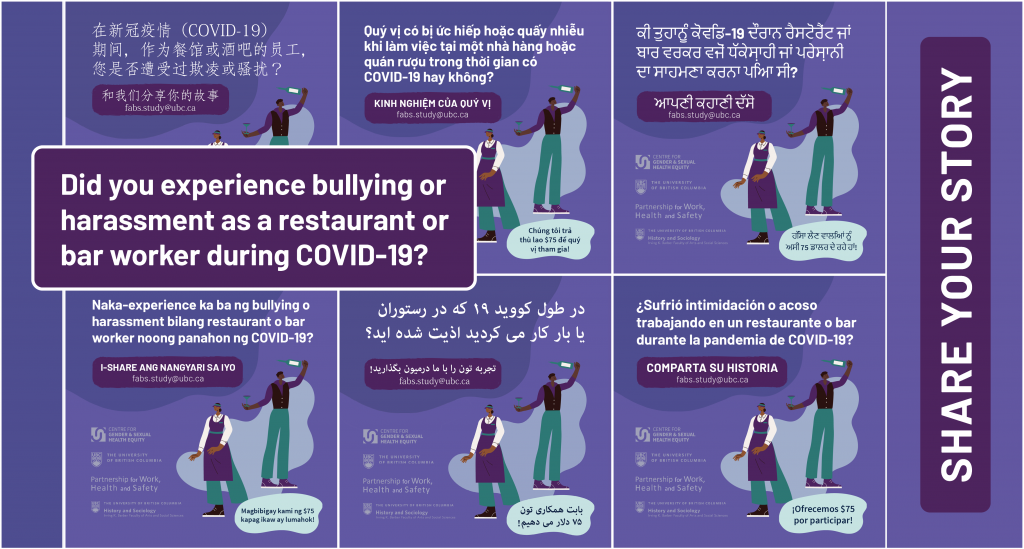
Share your story in Spanish, Filipino, Punjabi, Farsi, Vietnamese, Chinese, or English.
Recruitment
- We are looking for food and beverage sector workers to participate in our research looking at the impact of COVID-19 public health policies on the health and safety of restaurant workers. We seek to understand how public health restrictions created and/or exacerbated bullying, harassment, and violence against workers.
- We are conducting confidential, 60-minute interviews with people who worked in restaurants or bars in BC during the first two years of the COVID-19 pandemic and who experienced any kind of bullying, harassment, or violence.
- We are specifically seeking participants from Spanish, Filipino, Punjabi, Farsi, Vietnamese, and Chinese-speaking communities. Interviews can be conducted in any of those languages, or in English if preferred.
- Individuals will receive a $75 honorarium as a thank you for their time.
- Findings from this research will help us to develop guidelines to prevent harassment, bullying, and violence in food and beverage workplaces.
- We are looking to recruit participants who:
- are 18 years of age or older
- were employed at any type of restaurant or bar, including fast food restaurants, during the height of the COVID-19 pandemic (between March 2020 and April 2022)
- experienced any kind of bullying, harassment, or violence while working.
- are part of Spanish, Filipino, Punjabi, Farsi, Vietnamese, or Chinese-speaking communities.
- We know that women (cis and trans), gender diverse, 2SLGBQ+ people, BIPOC and im/migrant people are disproportionately negatively impacted as workers in the food and beverage service sector. Thus, we particularly welcome interviewing people from these communities.
- If you are interested in sharing your experiences, or you would like to learn more about the project, please contact: fabs.study@ubc.ca or Suhail Marino at suhail.marino@ubc.ca or 604-822-0200.
Background
- The COVID-19 pandemic exacerbated many work-related inequities, with essential workers having to work at considerable risk in environments with high risk of COVID-19 exposure.
- In BC, the food and beverage sector remained open throughout most of the pandemic, with reduced hours, masking, and restricted capacity. In August 2021, by order of the public health officer, patrons of licensed restaurants, pubs, and other establishments were required to show proof of vaccination for entry. Businesses were required to check for vaccination status and deny services to those not meeting this requirement.
- Women, LGBTQ+, racialized persons, and youth are overrepresented in the food and beverage service sector and in lower paid positions and are at high risk of harassment and violence at work. Such workers are often precariously employed and are at a power disadvantage with employers and customers.
- Growing evidence suggests that COVID-19 working conditions, including the requirement to enforce COVID-19 workplace safety protocols, puts these workers at a greater risk for harassment and violence as well as consequent negative physical and mental health outcomes.
More information
- Study Co-Principal Investigators: Dr. Chris McLeod, PWHS & Dr. Kathleen Deering, Centre for Gender and Sexual Health Equity.
- This mixed methods study is being conducted in collaboration with the Centre for Gender and Sexual Health Equity, and the Department of History and Sociology at UBC Okanagan at two research sites in BC: Metro Vancouver and the Central Okanagan region. There are three research objectives:
- Explore the gendered and racialized lived experiences of bullying, harassment, and violence of food and beverage sector workers while working under COVID-19 restrictions.
- Assess and characterize the prevalence and social-structural correlates of bullying, harassment, and violence of food and beverage workers in the Metro Vancouver and Central Okanagan regions.
- Work with community-based organizations, employer and worker associations, and WorkSafeBC, to develop and implement a knowledge translation strategy that will provide recommendations and guidelines to prevent and mitigate harassment and violence in the workplace due to public health measures.
